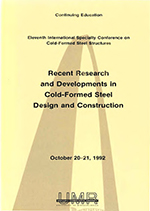Location
Saint Louis, Missouri
Session Dates
20 Oct 1992
Abstract
The findings of an investigation into the lateral buckling strength of cold-formed singly-symmetric stainless steel beams are reported in this study. The singly-symmetric sections under consideration were lipped channel sections fabricated from a modified AISI stainless steel Type 409 designated 3CR12, a ferritic corrosion resisting steel. The purpose of this study was to compare the experimental strengths of singly-symmetric sections to the theoretical predictions proposed by the new ASCE Specification for the Design of Cold-Formed Stainless Steel Structural Members. It was concluded in this investigation that the tangent modulus approach adopted in the design specification for stainless steels, compared well with the experimental results.
Department(s)
Civil, Architectural and Environmental Engineering
Research Center/Lab(s)
Wei-Wen Yu Center for Cold-Formed Steel Structures
Meeting Name
11th International Specialty Conference on Cold-Formed Steel Structures
Publisher
University of Missouri--Rolla
Document Version
Final Version
Rights
© 1992 University of Missouri--Rolla, All rights reserved.
Document Type
Article - Conference proceedings
File Type
text
Language
English
Recommended Citation
van der Merwe, P.; Bredenkamp, P. J.; and van den Berg, G. J., "The Lateral Torsional Buckling Strength of Cold-formed Stainless Steel Lipped Channel Beams" (1992). CCFSS Proceedings of International Specialty Conference on Cold-Formed Steel Structures (1971 - 2018). 3.
https://scholarsmine.mst.edu/isccss/11iccfss/11iccfss-session10/3
The Lateral Torsional Buckling Strength of Cold-formed Stainless Steel Lipped Channel Beams
Saint Louis, Missouri
The findings of an investigation into the lateral buckling strength of cold-formed singly-symmetric stainless steel beams are reported in this study. The singly-symmetric sections under consideration were lipped channel sections fabricated from a modified AISI stainless steel Type 409 designated 3CR12, a ferritic corrosion resisting steel. The purpose of this study was to compare the experimental strengths of singly-symmetric sections to the theoretical predictions proposed by the new ASCE Specification for the Design of Cold-Formed Stainless Steel Structural Members. It was concluded in this investigation that the tangent modulus approach adopted in the design specification for stainless steels, compared well with the experimental results.



